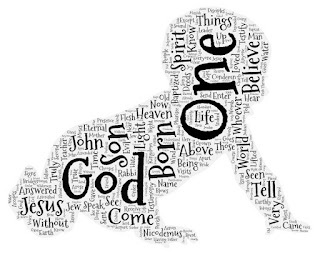This is supposed to be a baby.
But maybe it just looks like a creepy blob.
The Gospel of John, Chapter 3
Nicodemus, a Jewish leader, comes to Jesus at night. N. recognizes that Jesus is from God, because of the signs Jesus is doing. Jesus says that to see the kingdom of God a person must be born anew, or born from above. He uses birth as a metaphor for spiritual renewal. N. doesn’t get it.
Then Jesus pushes further, talking about not just seeing but entering the kingdom of God, which must be obvious what it is, because it is not defined. Only those who are “born of water and Spirit” can enter the kingdom of God. Jesus says to N., you just do not understand.
Speaking in the plural, Jesus says, we are testifying to what we have seen, but you all reject our testimony. But the way the scene was set, I had assumed Jesus was alone with Nicodemus. Whom is he accusing of rejecting his testimony?
Then, Jesus utters these famous words:
John 3:16 “For God so loved the world that he gave his only Son, so that everyone who believes in him may not perish but may have eternal life.”
But for me, it’s the next verse that is more important: “God did not send the Son into the world to condemn the world, but in order that the world might be saved through him.”
3:17 οὐ γὰρ ἀπέστειλεν ὁ θεὸς τὸν υἱὸν εἰς τὸν κόσμον ἵνα κρίνῃ τὸν κόσμον ἀλλ᾽ ἵνα σωθῇ ὁ κόσμος δι᾽ αὐτοῦ
In the Greek, the word translated as “world” is “kosmos”; the word translated as “condemn” is “krino” = “judge”.
But then the author of the gospel again goes for the antagonistic dichotomy - those who believe are saved; those who don’t believe are already condemned. Light vs. dark. The language here does not make mention of second chances. It does talk about evil deeds, which is a shift from the language of belief to something more concrete, but still not very well defined.
3:19-20 And this is the judgment, that the light has come into the world, and people loved darkness rather than light because their deeds were evil. For all who do evil hate the light and do not come to the light, so that their deeds may not be exposed.
Then Jesus & Co. go to Judea. Both Jesus and John the Baptist are there baptizing folks. John the B. says, again, that he himself is not the Messiah. He speaks of the Messiah in the metaphor of a bridegroom.
The last paragraph of the chapter is not speech attributed to anyone. It’s more a mini-sermon about those who accept Jesus’ testimony vs. those who don’t. Heaven vs. earth.
Metaphors: birth, wind, bridegroom, light, darkness.
Images and themes: being born from above, baptism, Messiah
People/Beings: Nicodemus, Jesus, God, the disciples, John the Baptist, “A Jew”
Places: Jerusalem, the Judean countryside.

No comments:
Post a Comment